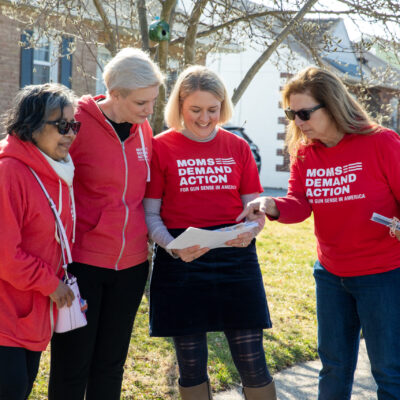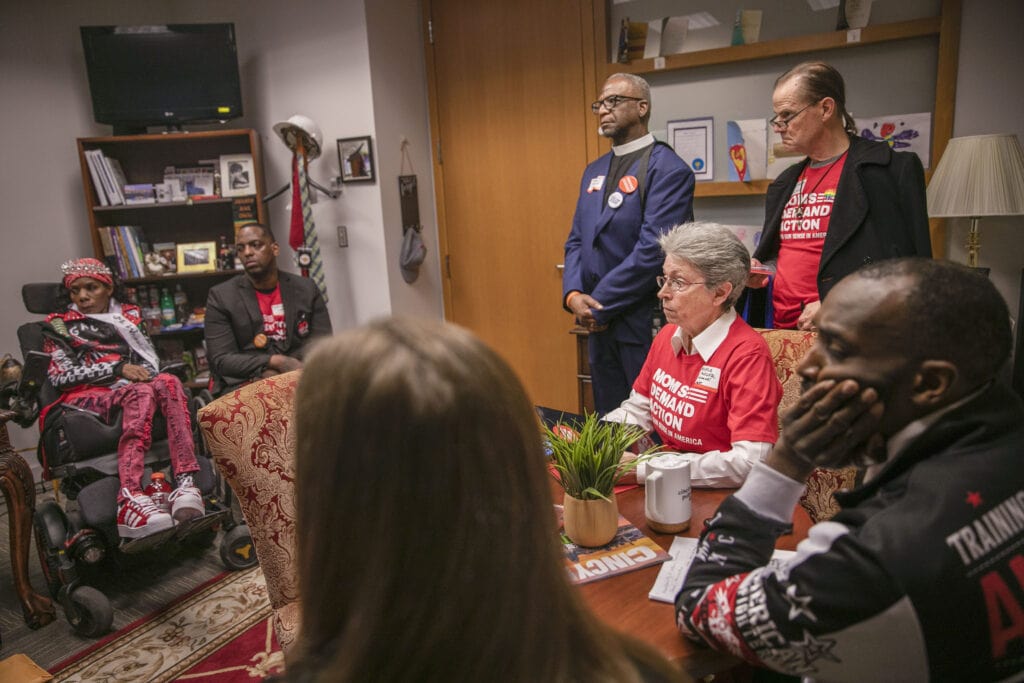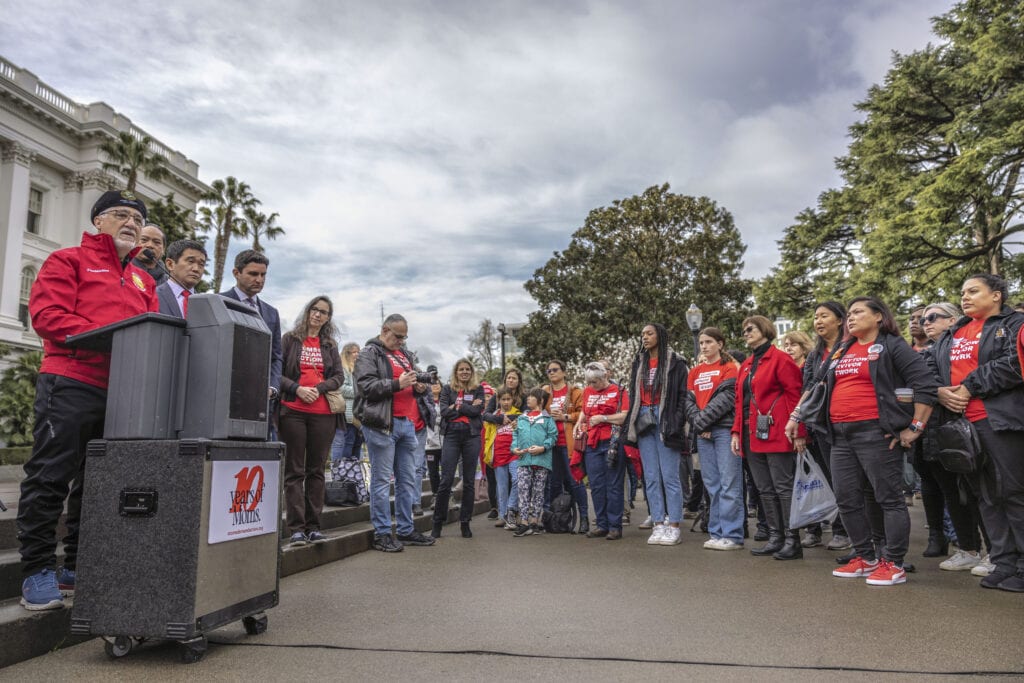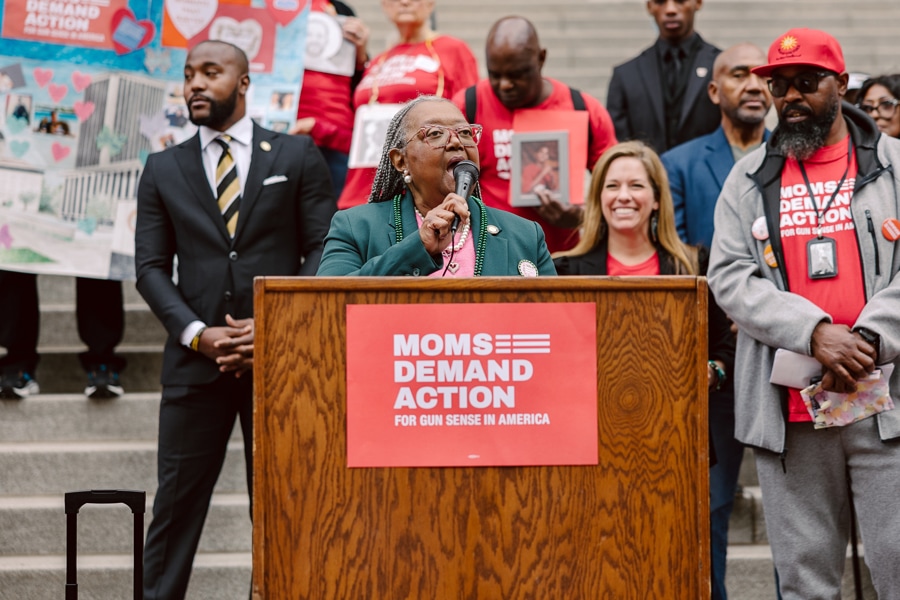Every year, Moms Demand Action volunteers join other gun safety advocates from across their state to plan, learn, and talk to lawmakers to urge them to pass gun safety laws. These convenings, called advocacy days, are part of the fabric of our movement.
Volunteers held the first version of an advocacy day just months after the founding of Moms Demand Action. Some early examples include:
- March 2013: South Carolina Moms Demand Action volunteers gathered to ask their lawmakers to prioritize gun safety.
- July 2013: Oregon volunteers held a “stroller jam” at the state capitol.
- January 2014: Washington state volunteers convened at their state capitol in January.
- May 2014: D.C. volunteers organized “Moms on the Hill” in May.
Here’s what you should know about advocacy days:
An advocacy day is a gathering of Moms Demand Action and Students Demand Action volunteers and survivors of gun violence from across the state to hold lawmakers to account. Advocacy days are traditionally in-person events. Since 2020, advocacy days have also expanded to include remote or hybrid gatherings.
On these days, volunteers meet at the state capitol—or virtually—for a quick training. Chapters review their priorities, like engaging in their communities or building local partnerships. They also go over their asks for lawmakers, including bills volunteers want to see passed (or blocked) in that legislative session. Gun-sense lawmakers and survivors of gun violence will often make speeches during this time.
Once people are in the Capitol building, they disperse to meet with lawmakers to discuss legislative asks. When possible, groups of constituents usually meet with their home district lawmakers.
Yes! Advocacy days are a chance for lawmakers to hear directly from their constituents about the bills that matter most to them. This puts a “face to a name” for lawmakers when they are working on legislation and is a great way to build relationships with lawmakers and their staff.
One advocacy day in Pennsylvania fell at a time when two strong gun safety bills passed the House, but hadn’t yet moved in the Senate. Volunteers did “thank you visits” with those who voted yes on one or more of these bills. Most of these meetings ended up being with staff.
Advocacy days also allow volunteers to show lawmakers how gun sense legislation can support causes they care about. For example, volunteers in Virginia met with a lawmaker who they knew prioritized supporting law enforcement. These volunteers explained that banning ghost guns was a strong way of protecting law enforcement from armed criminals. In a vote later that month, that same representative—endorsed by the NRA—voted to ban ghost guns.
Turnout at advocacy days can also show lawmakers how strongly their constituents support—or oppose—certain pieces of legislation. Our signature red t-shirts have become a staple at statehouses. Lawmakers feel our presence when we turn their statehouses red!
In June 2016, over 100 Moms Demand Action volunteers and other gun sense advocates showed up at the North Carolina statehouse. They were opposing HB562, a bill that would effectively repeal the state’s handgun background check system. Amid mounting opposition from Moms Demand Action volunteers and others, the bill was denied a vote and sent back to committee (essentially sending it back to the “edit” stage).
Days after the Allen, Texas, mall shooting, Moms Demand Action volunteers also turned out at the Texas capitol to demand change in support of the survivors of the shooting in Uvalde, Texas in 2022. Following that visit, a Republican-led committee unexpectedly voted to move a bill through committee that would raise the age for purchase of assault-style rifles from 18 to 21.
You can use our Moms Demand Action Event Lookup tool to see if your state’s advocacy day is coming up. If you don’t see one on the calendar, join your local Moms Demand Action chapter to stay updated on other events and to find out when the next advocacy day will take place.
If you are not able to attend your state’s advocacy day, consider participating in other ways. A social media message is often distributed so supporters across the state can call, email, post on social media, or otherwise target lawmakers to make their voices heard about the bill Moms Demand Action is addressing.












